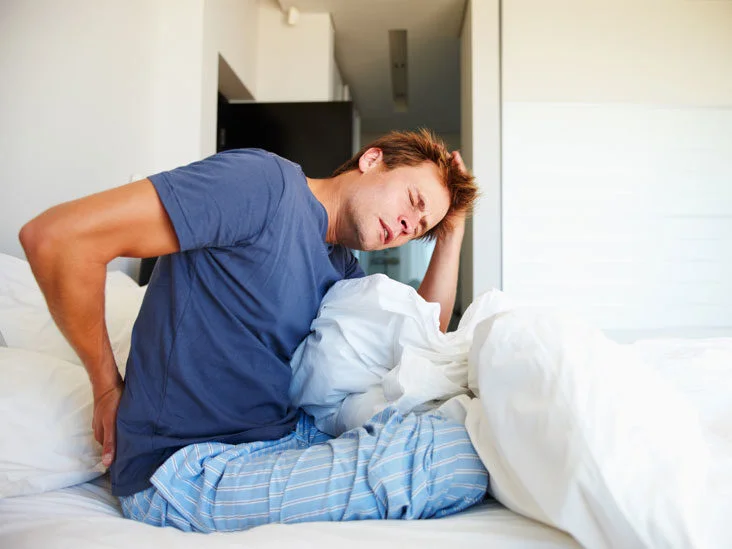In the intricacies of human health, our bodies communicate to us in a multitude of ways, some subtle and others not so subtle. One such peculiar duo of symptoms that people experience is lower back pain and diarrhea. This combination, although seemingly unrelated, can speak volumes about what’s happening inside your body. This blog post aims to delve into the possible reasons for the simultaneous occurrence of these symptoms, their underlying conditions, and how to manage them effectively.
Contents
Is It Normal To Have Back Pain With Diarrhea?
 Yes, experiencing back pain with diarrhea can be a normal symptom depending on the cause. Often, these symptoms are not serious and may resolve on their own within a few days. Several benign conditions can cause this symptom pairing, including food intolerances, viral or bacterial infections, or even stress. When your body is dealing with gastrointestinal distress such as diarrhea, it’s not uncommon for other muscles, including those in your back, to become tense or fatigued, causing discomfort or pain.
Yes, experiencing back pain with diarrhea can be a normal symptom depending on the cause. Often, these symptoms are not serious and may resolve on their own within a few days. Several benign conditions can cause this symptom pairing, including food intolerances, viral or bacterial infections, or even stress. When your body is dealing with gastrointestinal distress such as diarrhea, it’s not uncommon for other muscles, including those in your back, to become tense or fatigued, causing discomfort or pain.
However, persistent or severe lower back pain and diarrhea can be indicative of more serious conditions. It is important to seek medical advice if the pain is severe, if it lasts for more than a few days, or if it’s associated with other worrying symptoms. Such as high fever, bloody stools, or significant weight loss.
Common Causes Linking Lower Back Pain and Diarrhea
The link between lower back pain and diarrhea is not always immediately clear. As these symptoms can originate from a variety of different conditions. Here are some of the most common causes:
- Gastroenteritis
Often referred to as the “stomach flu,” gastroenteritis is an inflammation of the digestive tract usually caused by a viral or bacterial infection. Symptoms can include diarrhea, abdominal pain and cramping, nausea, and sometimes, lower back pain.
- Irritable Bowel Syndrome (IBS)
This common disorder affects the large intestine and can cause a range of symptoms, including diarrhea, abdominal pain, and sometimes, lower back pain.
- Inflammatory Bowel Disease (IBD)
Conditions like Crohn’s disease and ulcerative colitis fall under this category. They cause chronic inflammation in the digestive tract. Eventually, leading to symptoms such as diarrhea, abdominal pain, fatigue, and lower back pain.
- Kidney Stones or Kidney Infection
Both these conditions can cause severe lower back pain. Diarrhea isn’t a common symptom of these conditions but could occur if the individual has a concurrent gastrointestinal issue or reaction to the medications used.
- Gallstones
These can cause a range of symptoms, including lower back pain if the stones block the flow of bile to the intestine. This can also disrupt digestion, potentially leading to diarrhea.
- Endometriosis
This is a condition where the tissue that normally lines the inside of the uterus grows outside of it. It can lead to severe pain. That can radiate to the lower back and also disrupt bowel movements, causing diarrhea.
- Pancreatitis
Inflammation of the pancreas can cause abdominal pain that radiates to the back, as well as diarrhea. Particularly if the inflammation affects the production of digestive enzymes.
Remember, if you are experiencing lower back pain and diarrhea consistently, it is important to consult with a healthcare professional. They can help determine the cause and most appropriate treatment for your condition.
When to Seek Medical Help?
 While occasional episodes of lower back pain and diarrhea are not usually cause for alarm, there are certain situations that warrant prompt medical attention. Here are some signs and symptoms indicating that you should seek medical help:
While occasional episodes of lower back pain and diarrhea are not usually cause for alarm, there are certain situations that warrant prompt medical attention. Here are some signs and symptoms indicating that you should seek medical help:
Persistent Symptoms
If your lower back pain and diarrhea persist for more than a few days despite home care measures, you should consult a healthcare provider. This is particularly important if these symptoms are preventing you from carrying out your normal daily activities.
Severe Pain
Severe or intense lower back pain. Especially if it’s sudden or sharply localized, and needs to be assessed by a healthcare provider immediately.
Bloody or Black Stools
This can be a sign of gastrointestinal bleeding, which requires immediate medical attention.
Fever
A high fever, especially when accompanied by lower back pain and diarrhea, can be a sign of a more serious infection or other medical condition.
Dehydration Symptoms
These can include excessive thirst, dry mouth, dark-colored urine, or decreased urine output. Diarrhea can lead to dehydration quickly, especially in children and older adults.
Other Symptoms
Symptoms like unexplained weight loss, persistent vomiting, or symptoms of shock (like rapid pulse, pale or cold skin, and confusion) require immediate medical attention.
Pre-existing Medical Conditions
If you have a pre-existing condition like inflammatory bowel disease, or kidney disease, or are immunocompromised, you should seek medical help for any significant changes in your symptoms.
Remember, these are general guidelines and may not cover every possible scenario. When in doubt, it’s always best to consult a healthcare provider. They can evaluate your symptoms in the context of your overall health and medical history.
What Are Some Treatment Options To Help You?
Treatment options for lower back pain and diarrhea largely depend on the underlying cause of these symptoms. Here are some general options that could be recommended based on the cause:
- Over-the-counter Medications
Non-prescription drugs such as antidiarrheals (loperamide) and pain relievers (ibuprofen) can help manage mild symptoms.
- Prescription Medications
For more serious causes, a healthcare provider may prescribe specific medications. This could include antibiotics for bacterial infections, stronger pain relievers, anti-inflammatory drugs for conditions like IBD, or other treatments tailored to the specific condition causing the symptoms.
- Hydration and Rest
In the case of gastroenteritis or other minor illnesses causing these symptoms, staying hydrated and resting can often help your body recover.
- Dietary Changes
Certain foods may exacerbate diarrhea or lower back pain. Identifying and avoiding these foods can help manage symptoms. This may be particularly relevant for conditions like IBS or food intolerances.
If the lower back pain is related to muscle strain or a similar issue, physical therapy might be beneficial. Therapists can teach exercises and techniques to strengthen the back and improve posture.
- Surgery
In some cases, if the cause is gallstones, kidney stones, or a similar condition, and the problem persists despite medication, surgical intervention may be necessary.
Remember, the appropriateness of these treatments will vary greatly depending on the cause of your symptoms, your overall health, and your personal medical history. Always consult a healthcare provider for accurate diagnosis and treatment.
Prevention Tips For Lower Back Pain And Diarrhea
 Prevention strategies for lower back pain and diarrhea largely depend on the underlying causes. However, here are some general tips that may help prevent these symptoms:
Prevention strategies for lower back pain and diarrhea largely depend on the underlying causes. However, here are some general tips that may help prevent these symptoms:
1. Maintain a Balanced Diet
Consuming a diet high in fiber, drinking plenty of water, and avoiding food triggers can reduce the likelihood of diarrhea. This can particularly help manage conditions like IBS.
2. Exercise Regularly
Regular physical activity can strengthen the muscles in your back and abdomen, which can help prevent lower back pain. Just remember to warm up properly and use the correct form to avoid injuries.
3. Good Posture
Practicing good posture, whether sitting or standing, can help prevent lower back pain. If you work at a desk, ensure your workstation is ergonomically set up to support good posture.
4. Regular Hand Washing
Frequent and thorough hand washing can help prevent the spread of viral and bacterial infections that can cause gastroenteritis, a common cause of diarrhea.
5. Healthy Weight
Maintaining a healthy weight can help reduce the strain on your back, potentially preventing back pain.
6. Avoid Smoking
Smoking can impair blood flow, leading to oxygen and nutrient deprivation in spinal tissues. And it also increases the risk of osteoporosis, all of which can contribute to back pain.
7. Stress Management
High levels of stress can exacerbate symptoms of both lower back pain and diarrhea. Techniques such as deep breathing, yoga, mindfulness, and other relaxation methods can help manage stress levels.
8. Regular Check-ups
Regular medical check-ups can help detect and manage any potential health issues early, preventing symptoms such as lower back pain and diarrhea from becoming severe.
Remember, prevention strategies should be individualized based on personal health history, lifestyle, and existing medical conditions. Always consult with a healthcare provider for personalized advice.
Conclusion
In conclusion, the co-occurrence of lower back pain and diarrhea, though seemingly unrelated, can signify various underlying health conditions. From common instances such as gastroenteritis and food intolerances to more complex issues like IBS, IBD, kidney infections, or endometriosis, this symptom duo needs attentive understanding. Recognizing when these symptoms are normal and when they call for medical intervention is crucial for effective management.
With personalized treatment options ranging from lifestyle changes, and dietary modifications, to medications and physical therapy, most people can effectively manage these symptoms. We hope this information empowers you to take proactive steps toward your well-being and supports your journey toward optimal health.
If you’re experiencing Back pain, physical therapy for back pain at PhysioMantra can help: Book an online physical therapy session.



